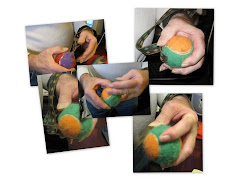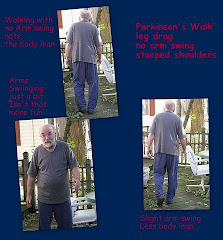 If you're a regular reader you know that Steve walks with a cane for maintaining balance and especially to support his arthritic knee(s). The cane is used in public and around the house. The cats are careful but sleeping dogs are often in the way. While the dogs don't jump up to throw him off balance, they usually remain stationary unless instructed to move. Their decision to lie still seems to be made either because they know they mustn't move suddenly or because they don't realize that they are spread across a hallway or blocking a narrow passage in our office.
If you're a regular reader you know that Steve walks with a cane for maintaining balance and especially to support his arthritic knee(s). The cane is used in public and around the house. The cats are careful but sleeping dogs are often in the way. While the dogs don't jump up to throw him off balance, they usually remain stationary unless instructed to move. Their decision to lie still seems to be made either because they know they mustn't move suddenly or because they don't realize that they are spread across a hallway or blocking a narrow passage in our office.Steve has no problem with gait freezing so he can use a regular cane, purchased not for beauty but for adjustability and economy. Early on when his cane use was arbitrary, he used to misplace them. He'd walk into a room with a cane but leave without it. Later the cane would be "lost." So we bought several including a folding cane for airplane use.
For those who need more balance support, there are four-footed style "quad" canes which provide that extra stability. There is a "couch/recliner" cane with a skid proof base and extra long grips to help one rise from a sitting position. A cane will support about 25% of your weight.
For those with gait freeze, there are laser canes which assist the PWP (person with Parkinson's) by shining a red laser light across the path to break the freeze and direct the next step. The canes are adjustable and battery operated. They cost between $225.00 and $275.00.
There are adjustable walkers with padded backs and seats, baskets and brakes. These have weight capacities between 250 to 400 pounds and sell for between $150.00 and $200.00 plus shipping. Walkers can support up to 50% of your weight.
The U-Step walker is exactly what you would expect, a solid walker complete with a seat for about $550.00 and up plus the add-on laser for $200.00. It has dead-man brakes which will also lock the wheels so that you can sit when necessary. The padded seat lifts to provide access to the basket. It is the laser light add-on which makes this walker unique. More expensive than a verbal cue, turning a cane upside down or a wadded piece of paper dropped as a marker, it is also practical for those with more advanced walking issues.
Currently there is an open label clinical trial NCT00320242 in Phase III sponsored by Beth Israel Deaconess Medical Center in Boston to assess the efficacy of visual cues of the laser cane or the U-Step Walker with laser accessory for PWP with gait freeze. The trials are located in Boston and at The Neurological Institute of New York at Columbia University.
There is also a Virtual Reality device available at a significantly higher price from two companies. Medigait LLC has two models for assistance. The less expensive model, the GaitAid Auditory Walker, provides a signal through the headphones depending upon foot placement. The goal is to create a ryhthmic and longer stride. The GaitAid Virtual Walker includes the auditory tones while the user wears see-thru goggles which superimpose a grid pattern on the floor. It is reported that there is a serious improvement after just two practice sessions of 30 minutes each. The figures vary but are a testament to the plasticity of the brain and the ingenuity of scientists and researchers. These goggles are meant for (re)training purposes only and are not worn on the street.
Apparently still in pre-production is the brainchild of Tom Riess, a podiatrist with PD who developed spectacles - augmented reality - which are now known as a visual cueing system. He sold the concept to HMD Therapeutics who in turn licensed it to Enhanced Visual Systems. Unlike the GaitAid Virtual Walker, these glasses appear to fit over even very large eyeglasses.
Loss of mobility is a serious problem for PWP but having aids can be a quality of life-saver.
Clinical trial:
NCT00320242 is a can't lose clinical trial since it is open label and is a comparison of efficacy of these gait freeze aids.
http://clinicaltrials.gov/ct2/show/NCT00320242
Interesting reading:
http://portal.acm.org/citation.cfm?id=1498190
How to use walkers and canes:
http://orthoinfo.aaos.org/topic.cfm?topic=A00181
Kinesia Paradoxa or gait freeze
http://www.hitl.washington.edu/publications/prothero/node13.html
Detailed information on virtual reality glasses
http://cordis.europa.eu/ictresults/index.cfm?section=news&tpl=article&BrowsingType=Features&ID=57062
Specifics on the visual cueing system and Kinesia Paradoxa in Parkinson's disease
http://www.rehab.research.va.gov/jour/07/44/3/pdf/kaminsky.pdf
You'll find a video here:
http://www.sciencedaily.com/videos/2007/1201-glasses_help_parkinsons_patients.htm














No comments:
Post a Comment
Welcome to Parkinsons Focus Today.
We are delighted to hear from you by comment here
or through email as found in Contact Us.
Please do not include email addresses if leaving a comment online.
Email addresses are used only for email responses.
Spammers take note: your messages will not be published. The comments section is for an exchange of ideas, not for backlinks.